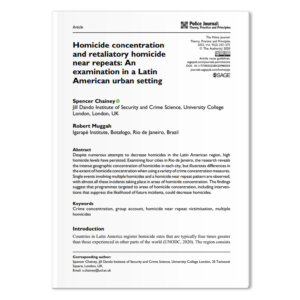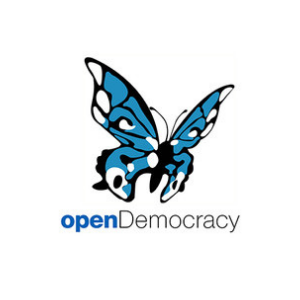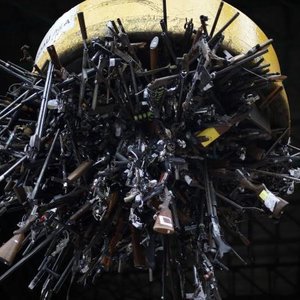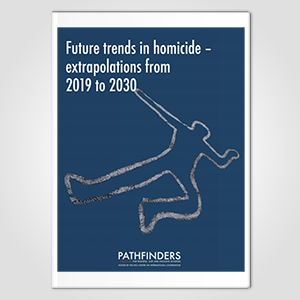
In Brazil, QAnon Has a Distinctly Bolsonaro Flavor
When Brazilian President Jair Bolsonaro repeatedly downplayed the threat of COVID-19, Brazilians were understandably confused about the gravity of the pandemic.

When Brazilian President Jair Bolsonaro repeatedly downplayed the threat of COVID-19, Brazilians were understandably confused about the gravity of the pandemic.

Globalization is the most progressive force in the history of humankind.

Despite numerous attempts to decrease homicides in the Latin American region, high homicide levels have persisted.

Is it possible for societies to reduce crime without creating or exacerbating adversarial relationships between the police and citizens?

Late last year, Colombia’s federal police arrested Diego Optra, a crime boss who heads a ruthless gang called La Local in the port city of Buenaventura.

The global green transition will accelerate – and not a moment too soon.

The COVID-19 pandemic could give rise to positive innovations in cities and a radical intolerance of the status quo

While the coronavirus pandemic is ravaging around the globe, we will continue to experience unprecedented urbanization in the coming decades.

Discrimination and violence against Brazil’s LGBTQ communities are widespread, yet often underreported

At 8:45 pm, five gunmen stormed the Holey Artisan Bakery, an upscale establishment in Dhaka, the capital of Bangladesh.

Central Asia was long a digital backwater

Brazilians are preparing nervously for their own municipal elections on November 15

This is the startling observation made by authors Ian Goldin and Robert Muggah in the introduction to their fascinating new book, Terra Incognita

Maps are not just informative, they are empowering. They can help provide a new perspective to age-old problems

Around the world, responses to the first and second waves of the COVID-19 pandemic are understandably focused on reducing infections and fatalities.

Robert Muggah and Katherine Aguirre contributed with a chapter for The Oxford Handbook of the Sociology of Latin America.

The COVID-19 pandemic is a profoundly urban crisis. The vast majority of the millions of reported cases worldwide are concentrated in overcrowded neighbourhoods and informal settlements.

This article is part of a series in which leading experts reflect on emerging trends for cities seeking to address hate, polarisation and extremism.

One of the first countries to register a Covid-19 outbreak, South Korea, flattened the curve in stunning fashion. It registered over 22,000 cases, yet fewer than 400 deaths at the time of writing.

JBS, the world’s largest meatpacker, is turning to blockchain to ensure the traceability of the tens of thousands of cattle it processes every day in Brazil, following intense pressure from both investors and activists over its environmental record.

At the United Nations, the world’s longest Zoom meeting is underway as presidents and prime ministers meet virtually amidst a pandemic that has killed almost a million people, an economic depression with no modern parallel, and a tide of polarization and division that threatens the social fabric in many countries.

The world’s longest Zoom call is underway at the United Nations General Assembly today.

The digital economy has finally arrived.

Brazilian President Jair Bolsonaro defended his administration’s record protecting the Amazon rainforest, telling the United Nations’ virtual meeting of global leaders on Tuesday that his country has been wrongly portrayed as an environmental villain. Bolsonaro’s critics were quick to pick apart his claims.

Around the world, COVID-19 is accelerating polarization and division.

We can give people a better sense of what’s happening around them at a time of extreme confusion and a motivation to act. Because ultimately, the future is what we make it, says ‘Terra Incognita’ co-author Dr Robert Muggah.

As we show in our new book Terra Incognita, COVID-19 is exacerbating multiple forms of inequality within and between countries and cities, and raising fundamental questions about the future of urban living.

Muggah, who runs a think-tank working on data-driven justice across Latin America called Igarapé Institute, says that Colombia’s sky-high rate of homicide made it not just difficult to differentiate the victims of serial killers from all the other victims, but it made it incredibly hard for the police to investigate, much less prosecute perpetrators.

Most countries have actually experienced sustained declines in homicidal violence across several decades. Notwithstanding the disruptive effects of COVID-19 and associated economic stresses in 2020, these trends are expected to continue in several parts of the world.

The Igarapé Institute uses cookies and other similar technologies to improve your experience, in accordance with our Privacy Policy and our Terms of Use, and by continuing to browse, you agree to these conditions.

O Instituto Igarapé utiliza cookies e outras tecnologias semelhantes para melhorar a sua experiência, de acordo com a nossa Política de Privacidade e nossos Termos de Uso e, ao continuar navegando, você concorda com essas condições.

